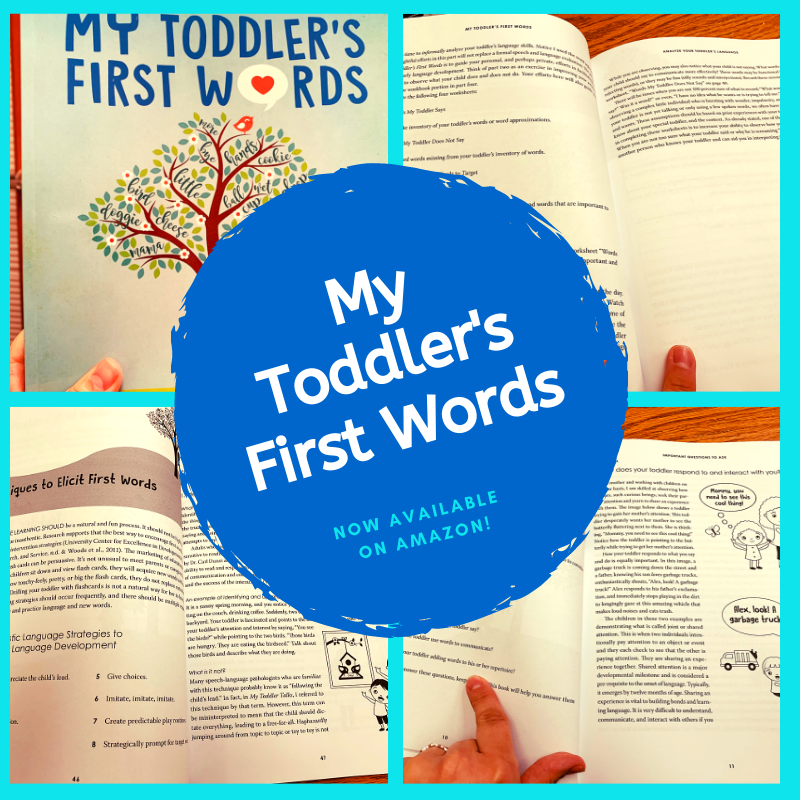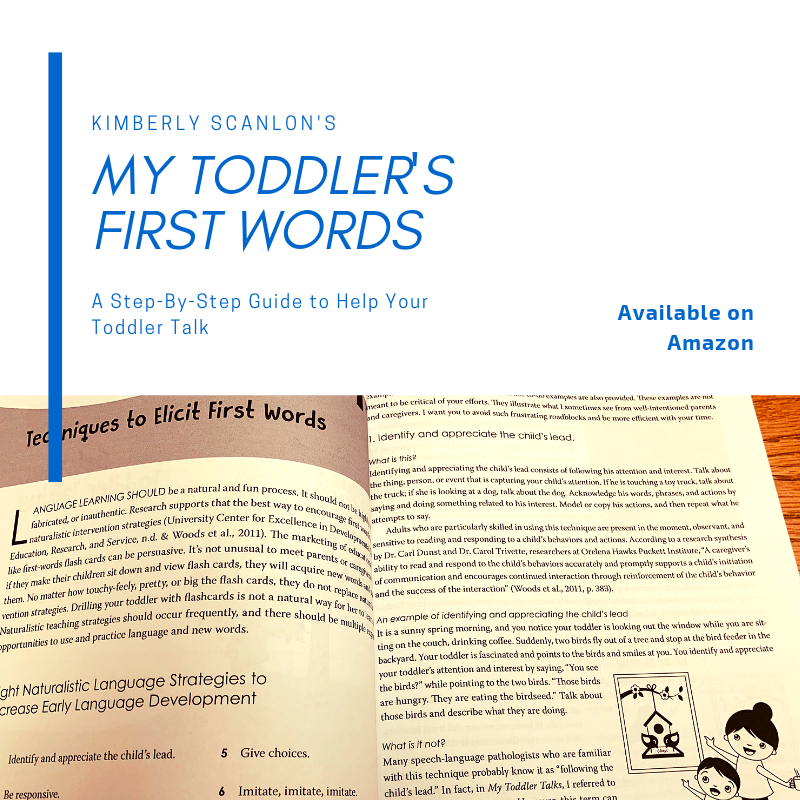My Toddler's First Words is NOW on Amazon!
After YEARS of researching, writing, designing, and re-writing, I’m so happy to announce that my book, My Toddler’s First Words: How to Jump-Start, Track, and Expand Your Toddler’s Language is now available on Amazon!
What’s This Book About?
My Toddler’s First Words: How to Jump-Start, Track, and Expand Your Toddler’s Language was written to help readers learn fundamental concepts to jump-start a toddler’s (first words) ability to communicate and talk. It contains easy to understand instructions to stimulate your child’s early communication skills. With expert guidance, you’ll discover what to expect from your child’s first words and learn to recognize each milestone along their language development journey. Learning these effective speech therapy techniques will help to catapult your toddler’s communication skills to the next level. The coaching and advice I offer in this book grew out of my clinical experiences over the past ten years in combination with evidence-based peer-reviewed research.
In My Toddler's First Words, you’ll discover:
- Proven speech therapy techniques and real-world examples to encourage language growth
- Lists of words that tend to develop early on that may be missing from your child’s vocabulary
- A systematic approach for tracking progress to pinpoint which activities work best for your toddler
- How to coordinate your developmental efforts with speech language professionals to compound the benefits
- Straight answers to your most pressing questions and concerns, and much, much more!
Who Should Read This Book?
Perhaps you’re a parent and have a toddler who is not yet speaking and this worries you. I wrote this book to help you help your child find his voice. But not only that, I want you to simultaneously enjoy the language building process and not feel overly-burdened with anxiety or concern. As parents, we have enough to fret and worry about. I want your little one to find joy in communicating with you and I want you to feel empowered knowing that you’re learning, doing something, and making a difference. As they say, knowledge is power. One of my major goals is to help you feel good about yourself and your child. This is because My Toddler’s First Words should give you some competence and confidence in facilitating spoken first words from your toddler.
While my book was written primarily for parents, fellow speech-language pathologists (SLPs) and other professionals who are coaching and training parents in clinics or through state-run early-intervention programs have also found it to be extremely useful.
Professionals who read earlier versions of My Toddler’s First Words greatly appreciated the cited research to support their own efforts and recommendations. The reference list is almost 6 pages long! In fact, some even feel this book is so comprehensive that it could be used as reading in a core SLP class like Language Development. But, parents, do not be scared because despite this book’s depth of information, I strived to keep it straightforward and easy to read especially for those tired parents who may only have a few minutes to read each day. Many of my SLP readers also said that the journaling portion was a powerful way to encourage parents to be more mindful of how they implement the strategies. Additionally, they liked that this book made their sessions a bit easier because parents could jot down questions or discuss points they may have otherwise forgotten to ask or mention at their child’s last session.
What’s In the Book?
This interactive book has four parts.
The first part, Toddler Language Development Basics, provides information on emerging language development. If you have ever wondered why a toddler is more likely to say “mama” or “doggy” or “uh-oh” instead of mother or ostrich or Jiminy Cricket, then this chapter’s for you. Knowing how and why toddlers learn to say first words will empower you to select appropriate ones to target and set realistic expectations.
In part two, Analyze Your Toddler’s Language, you informally study your toddler’s language. Using the worksheets in this part, I’ll carefully direct you to reflect and consider your toddler’s language, needs, and wants within the context of your family dynamic. Completing these worksheets may take some time, but going through the process will help you to best understand and serve your toddler and family.
The third part of this book, Get Your Toddler Talking, teaches you how to facilitate language development. Not only do I share eight evidence-based techniques, but also I provide tips on how to create a language-rich environment and troubleshooting suggestions for those times when your toddler does not want to say the chosen target word. Though I strived to make the information straightforward and rich with examples to ease learning, you may have to reread certain sections, particularly the techniques portion. I encourage you to do this because rereading is an effective way to better understand new information.
The last part of this guide, Make It Happen, includes an interactive 30-Day Workbook. This workbook was created to inspire you to establish a regular practice to reflect on your efforts in stimulating your toddler’s language. I purposefully designed this 30-Day Workbook with busy parents and professionals in mind. The daily questions are consistent to keep you focused on the goals at hand. Only a few lines are provided for your response, as I wanted to make this journal section a no-fuss record keeper.
Here is a short video of me flipping through the book and explaining its contents:
Amazon affiliate links have been included for your convenience.




